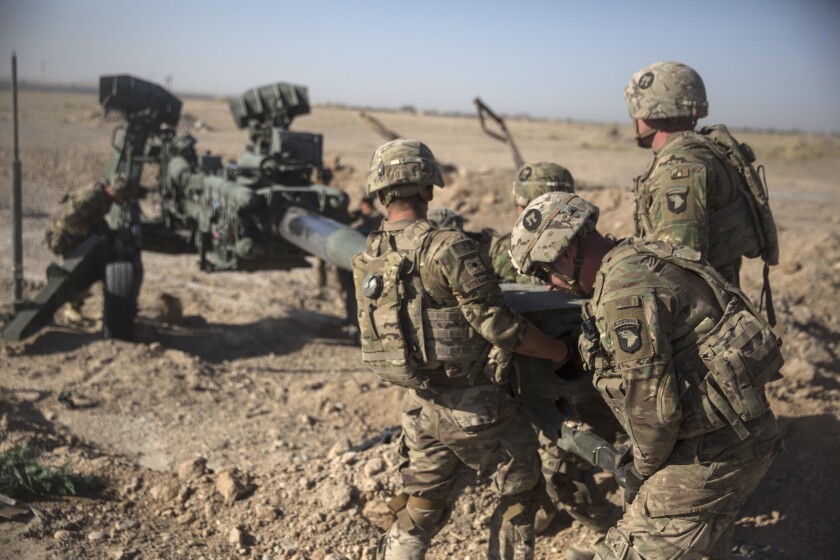 It has now been more than five months since a U.S. intelligence assessment included in President Trump’s Daily Brief suggested that Russia was paying bounties to Taliban fighters for attacking U.S. and other foreign forces in Afghanistan. And it has been more than a month since news of the intelligence reports became public.
It has now been more than five months since a U.S. intelligence assessment included in President Trump’s Daily Brief suggested that Russia was paying bounties to Taliban fighters for attacking U.S. and other foreign forces in Afghanistan. And it has been more than a month since news of the intelligence reports became public.
Yet the president and his administration still have not adequately denounced Russian activity or outlined a strategy to counter this type of hybrid warfare.
It’s possible, of course, that countermeasures unknown to the public are underway, but silence from Washington on the matter is a bad idea. It emboldens U.S. adversaries, who are increasingly using irregular means to undermine U.S. interests.
U.S. national security remains bound by static orthodoxies that don’t fully recognize the blend of unlikely bedfellows and state and non-state actors that have become the norm on today’s national security stage.
The Trump administration’s National Security Strategy and National Defense Strategy took important steps in recognizing the direct and broad challenges from China and Russia. But at the same time, the U.S. government’s response has swung like a pendulum — from an intense focus on counterterrorism to more conventional state-based confrontation. U.S. defense planning scenarios, war games, weapons programs, and budget priorities remain largely devoted to preparing for conventional war.
There has yet to be a fundamental recognition that the security environment today presents a blend of unconventional and state-driven asymmetric threats. Until we recognize this, America will have a blind spot that its enemies can exploit.
As Russia’s activities in Afghanistan highlight, the lines between state and non-state activity are blurred. Russia has been crossing those lines for more than half a decade. In 2014, for example, Russia seized Crimea — a part of Ukraine — with special operations forces and intelligence units. Then, Russian President Vladimir Putin quickly shifted his attention to eastern Ukraine, which had tossed out its pro-Russian leader in favor of a pro-Western one. But there, instead of using conventional Russian troops, he started an insurgency by supporting pro-Russian separatists.
In 2015, Russia became directly involved in the Syrian war, leveraging a sordid mix of Syrian units, Lebanese Hezbollah, Shia militias and Russian private military companies. Moscow’s willingness to work with Hezbollah — a U.S.-designated terrorist organization that has killed hundreds of U.S. soldiers in Lebanon and other countries — should have been a clear indication that Moscow had turned a corner.
In 2017, Gen. John “Mick” Nicholson, the commander of U.S. forces in Afghanistan, confirmed that Russia was providing money and arms to the Taliban. In addition, Moscow expanded its use of private military companies like the Wagner Group to more than 30 countries, including Libya and Venezuela, on four continents. Russian activities in Venezuela were particularly galling since Putin sent Russian contractors to provide security to President Nicolás Maduro, even as the United States and allied countries were trying to increase pressure to oust the regime in Caracas.
Russia’s goal in using irregular means is straightforward: to undermine the United States and increase Moscow’s influence. Following the collapse of the Soviet Union and expansion of NATO to Russia’s borders, Putin has attempted to rebuild Russian influence in the world.
Since his country cannot match the economic or military might of the United States, Putin has resorted to covert and deniable operations. Among the most aggressive are Russia’s cyber operations, from targeting the 2016 U.S. election to conducting widespread disinformation in the United States today. And Russia is not alone.
Iran aids more than 200,000 militia fighters in Syria, Iraq, Lebanon, Yemen and other countries through the Islamic Revolutionary Guard Corps. China has developed sophisticated cyber capabilities to spread disinformation and conduct espionage worldwide. China and Russia also recently hacked into Western coronavirus research labs.
The United States has not adapted to this evolving landscape of threats.
The U.S. intelligence community needs to better identify these new types of threats and networks and counter them aggressively with both overt and covert actions. New life should be injected into the National Counterterrorism Center, which should focus on hybrid threats. The Department of Justice should redouble efforts to prosecute networks of criminals and corrupt officials that enable sophisticated state-driven cyber, information, and financial operations.
The U.S. military should ensure that it has the posture, capability, and authority to conduct irregular warfare. Though conventional forces are important, the main tools of U.S. adversaries are not fighter jets or battle tanks, but hackers, spies, special operations forces and companies with links to state security agencies.
The Treasury Department needs to use its authority to uncover and sanction financial networks, channels and facilitators that link nefarious state and non-state networks. The State Department needs a major injection of funding to strengthen its public diplomacy and leadership in information operations at a time when tools like the Voice of America have been hobbled.
And there needs to be more aggressive coordination with the private sector, enabled by the Department of Homeland Security, to protect U.S. critical national systems and ensure resilience.
As Russia’s activities in Afghanistan highlight, U.S. adversaries are using proxies like the Taliban and Hezbollah to undermine U.S. influence. Without a more effective U.S. response, countries like Russia, China and Iran will be encouraged to ramp up such hybrid activities.
Seth G. Jones directs the Transnational Threats Project at the Center for Strategic and International Studies. Juan C. Zarate is global co-managing partner for K2 Intelligence/Financial Integrity Network. He served as deputy national security adviser for combating terrorism in the George W. Bush administration.
No comments:
Post a Comment